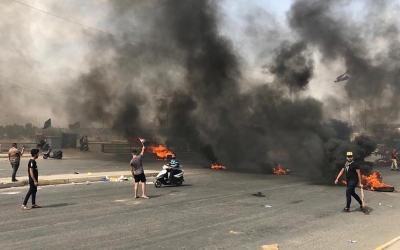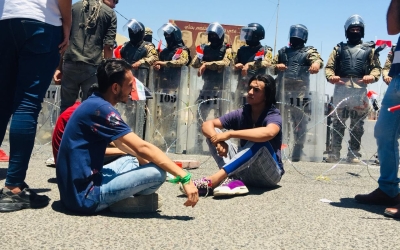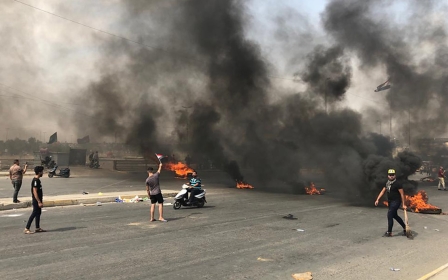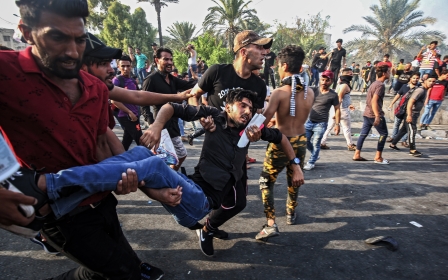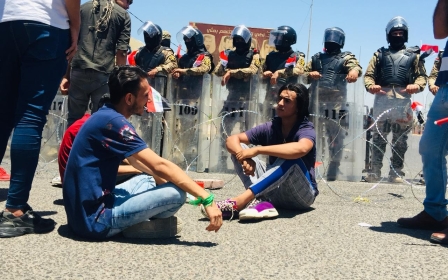Death toll climbs as unrest spreads in Iraq
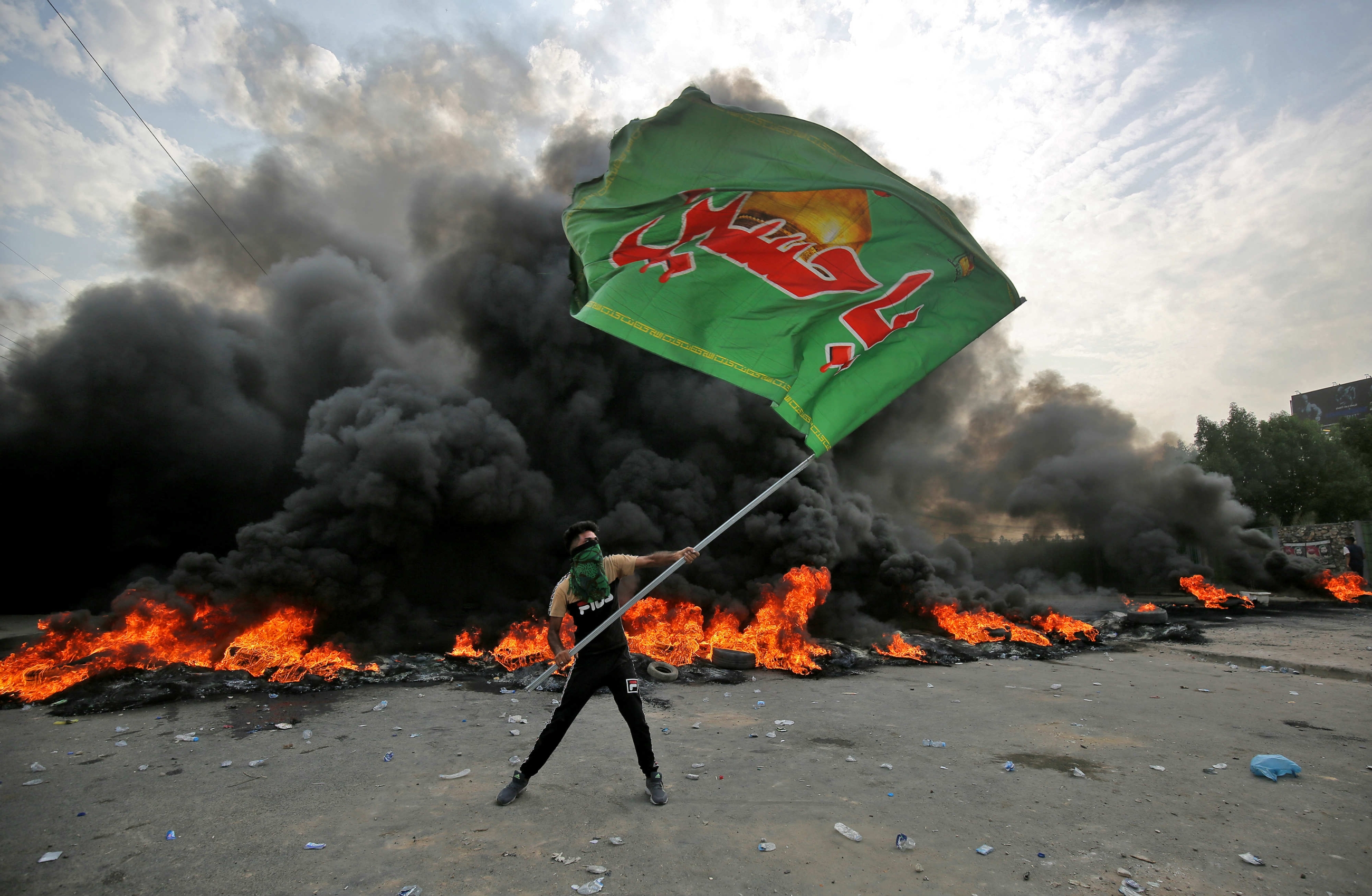
At least six people were shot dead on Thursday on the third day of protests in the Iraqi city of Nasiriya, local officials confirmed, as anti-corruption protests run into their third day.
The death toll has now reached at least 27, including two police officers, according to the Reuters news agency, as Iraqi security forces continue to fire live ammunition into crowds of protesters.
AFP put the total number of deaths at 31, as regional health chief Abdulhussein Al Jaberi told the news agency that at least 56 people had been wounded during Thursday's protests.
The protests, which began over unemployment and poor public services, have escalated into calls for a change in government, as Baghdad struggles to grapple with the protests.
In a televised speech late on Thursday, Iraqi Prime Minister Adel Abdul Mahdi urged calm.
New MEE newsletter: Jerusalem Dispatch
Sign up to get the latest insights and analysis on Israel-Palestine, alongside Turkey Unpacked and other MEE newsletters
Mahdi said there there was no 'magic solution' to Iraq's problems, but pledged to try to pass a law granting poor families a basic income, Reuters news agency reported.
Overnight, 11 people were killed during protests in two southern Iraqi cities, including a policeman, medical and police sources told the Reuters on Thursday.
Six protesters and a policeman died in Nassiriya during clashes between demonstrators and security forces, the sources said. Four more people were killed in the city of Amara.
Another protester was shot dead on Thursday morning in the province of Dhi Qar, regional health chief Abdulhussein al-Jaberi said.
Baghdad curfew
Troops patrolled central areas of Baghdad early on Thursday to enforce a curfew ordered by Iraq's Prime Minister, but sporadic demonstrations continued in some parts of the Iraqi capital, Reuters witnesses said.
Earlier, curfews had been imposed in Nassiriya, Amara and Hilla.
Iraqi security forces fired live rounds to break up protests on Thursday morning, an AFP photographer said, despite the curfew.
A few dozen protesters were burning tyres in the capital's central Tahrir Square but riot police encircled them, pushed them into side streets and fired in the air, the photographer said.
The unrest grew quickly from small-scale protests in Baghdad on Tuesday over jobs, services and government corruption.
At least two people were killed that day as security forces opened fire with live rounds and shot water cannon and tear gas.
Five more were killed on Wednesday, including a child. Hundreds have been wounded including demonstrators and police.
Bahrain called on its citizens on Thursday not to travel to Iraq for the time being due to security tensions, according to Reuters.
The foreign ministry statement also called all Bahraini citizens in Iraq to leave immediately as a precaution.
Iran border crossings closed
Two border crossings to Iraq, including one widely used by Iranian pilgrims, have been closed because of the unrest, the semi-official news agency Mehr cited Iran's border guards commander as saying on Thursday.
General Qasem Rezaei said the Khosravi and Chazabeh crossings had been closed since late Wednesday, Mehr reported.
A senior Iranian pilgrimage official told state television that the Khosravi border crossing was closed, but other crossings were open ahead of an annual Shia pilgrimage in Iraq.
On Wednesday, elite counterterrorism troops opened fire on protesters trying to storm Baghdad airport and deployed to the southern city of Nassiriya after gunfights broke out between protesters and security forces, police sources told Reuters.
"All vehicles and individuals are totally forbidden to move in Baghdad as of 5am today, Thursday, and until further notice," Abdul Mahdi said in a written statement.
Travellers to and from Baghdad airport, ambulances, government employees in hospitals, electricity, and water departments, and religious pilgrims are exempt from the curfew, the statement said.
It was up to provincial governors to decide whether to declare curfews elsewhere.
Internet blackout
The tension has been exacerbated by a near-total internet shutdown, the closure of government offices and at least one overnight explosion that hit the Green Zone, where some ministries and embassies are located.
A security source inside the area told AFP there were two blasts, likely caused by indirect fire a little over a week after two rockets hit near the US embassy.
The apparent attack came hours after security forces sealed off the Green Zone "until further notice," fearing angry protesters would swarm state buildings or foreign missions.
Demands on Wednesday included the "fall of the regime" and protesters set government and political party buildings ablaze in two other southern provinces.
The slogan, "the people demand the fall of the regime," was popularised during the 2011 Arab Spring uprisings.
'Bunch of thieves'
According to official figures, since 2004 almost $450bn of public funds have vanished into the pockets of politicians and businessmen.
Iraq is currently ranked as the world's 12th most corrupt country according to Transparency International's Corruption Perceptions Index.
In addition, youth unemployment in Iraq is about 25 percent, according to the World Bank, in a country where the vast majority of the population is under 30.
"The government is fucking stupid. We are not given any rights," Oussama Walid, a protester from the al-Washash neighbourhood, told Middle East Eye on Tuesday.
"[The media] must explain what’s going on here to the world to have a change. Try to explain, help us, help the people."
Abd al-Salam Shaker, missing one leg and sitting in a wheelchair in the heart of the protests, said the government was made up of "a bunch of thieves".
Security chief sacked
Although the problems facing Iraqis have existed for years, this week's protests - which also took place in northern and southern Iraq - appear to have been sparked by the decision to remove Lieutenant General Abdulwahab al-Saadi from his role as head of the elite Counter-Terrorism Service (CTS).
Saadi is widely popular in Iraq for heading the CTS, which was at the forefront of the fight against IS.
Seen as a non-corrupt and non-sectarian Iraqi nationalist, Saadi - a Shia - commanded support from across Iraq's ethnic and religious groups.
One protester, who did not want to be identified, said he was just waiting for Saadi to come and "lead the protests".
"Our aim is to push for a powerful leader. I myself believe that he can lead us. I’m sure that he’s interested to come forward, but he needs the people to show they are behind him," he said.
Salam al-Massudi, another protester, went further.
"We want Saadi to be appointed prime minister of the government," he said.
Middle East Eye delivers independent and unrivalled coverage and analysis of the Middle East, North Africa and beyond. To learn more about republishing this content and the associated fees, please fill out this form. More about MEE can be found here.


